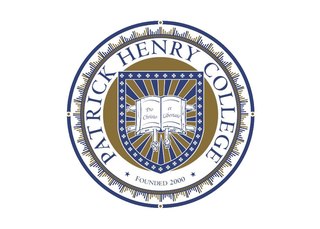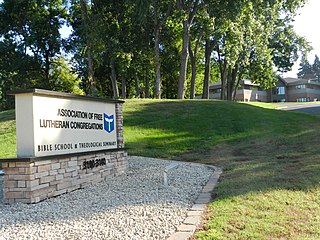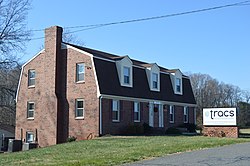
Patrick Henry College (PHC) is a private liberal arts non-denominational conservative Protestant Christian college located in Purcellville, Virginia. Its departments teach classical liberal arts, government, strategic intelligence in national security, economics and business analytics, history, journalism, environmental science and stewardship, and literature. The university has full accreditation from the Commission on Colleges of the Southern Association of Colleges and Schools (SACS-COC) as of 2022. Patrick Henry College continues to be accredited by the Transnational Association of Christian Colleges and Schools (TRACS), which is also recognized as an institutional accreditor by the United States Department of Education. Its graduation rate is 67%.

The Institute for Creation Research (ICR) is a creationist apologetics institute in Dallas, Texas, that specializes in media promotion of pseudoscientific creation science and interpretation of the Genesis creation narrative as a historical event. The ICR adopts the Bible as an inerrant and literal documentary of scientific and historical fact as well as religious and moral truths, and espouses a Young Earth creationist worldview. It rejects evolutionary biology, which it views as a corrupting moral and social influence and threat to religious belief. The ICR was formed by Henry M. Morris in 1972 following an organizational split with the Creation Science Research Center (CSRC).

Free Lutheran Bible College and Seminary (FLBCS) is one institution of higher education consisting of two programs, the undergraduate Free Lutheran Bible College (FLBC) and the four-year pastoral training program Free Lutheran Seminary (FLS). FLBCS is accredited through the Transnational Association of Christian Colleges and Schools (TRACS), a member of the Evangelical Council for Financial Accountability (ECFA), and an associate member of the Association for Biblical Higher Education (ABHE). FLBCS is located in Plymouth, Minnesota, near the national offices of the Association of Free Lutheran Congregations (AFLC).

Morris Brown College (MBC) is a private Methodist historically black liberal arts college in Atlanta, Georgia. Founded January 5, 1881, Morris Brown is the first educational institution in Georgia to be owned and operated entirely by African Americans.

Patriot Bible University (PBU), formerly known as Patriot University, is an unaccredited Independent Baptist correspondence school located in Del Norte, Colorado, which issues religious degrees only. According to the State of Colorado, Patriot's "degrees or diplomas have no state recognition". PBU is not accredited by any agency recognized by the Department of Education. It has been called a diploma mill, lacking sufficient academic standards to award degrees.
American Accrediting Association of Theological Institutions (AAATI) is a Christian nonprofit organization based in Rocky Mount, North Carolina. It was founded by Cecil Johnson, president of Christian Bible College, a distance education Bible college based in Rocky Mount North Carolina.

New Saint Andrews College is a private classical Christian college in Moscow, Idaho. It was founded in 1994 by Christ Church, and modeled in part on the curriculum of Harvard College of the seventeenth century. The college offers no undergraduate majors, but follows a single, integrated classical liberal arts curriculum from a Christian worldview in its associate's and bachelor's degree programs. The college also offers master's degrees in theology and letters and classical Christian studies. The New Saint Andrews board, faculty, and staff are confessionally Reformed (Calvinist). Board members are affiliated with the Communion of Reformed Evangelical Churches (CREC).

Paine College is a private, historically black Methodist college in Augusta, Georgia. It is affiliated with the United Methodist Church and Christian Methodist Episcopal Church. Paine College offers undergraduate degrees in the liberal arts, business administration, and education through residential, commuter, and off-site programs. The college is accredited by the Transnational Association of Christian Colleges and Schools (TRACS).
Temple Baptist Seminary is the graduate school of Christian theology of Piedmont International University. Originally established as "Southeastern Baptist Theological Seminary" in Chattanooga, Tennessee in 1948, the name was changed to Temple Baptist Theological Seminary five years later, after the Southern Baptist Convention founded its own Southeastern Baptist Theological Seminary. The seminary became a part of Piedmont when its parent school, Tennessee Temple University, merged with it in 2015.

Luther Rice College & Seminary is a private Baptist college and seminary in Lithonia, Georgia. Through the college and seminary the institution offers bachelor's, master's, and doctoral degrees in leadership, counseling, apologetics, Christian worldview, Christian studies, and Christian ministry. The school is recognized as being theologically conservative.
Name It and Frame It? is a 1993 book, written by Steve Levicoff, about unaccredited Christian colleges and universities, exploring the accreditation process and the nature of legitimate and illegitimate unaccredited institutions of higher learning. The fourth edition contains updated information and responses from some of the surveyed schools. The Council for Higher Education Accreditation, the National Center for Science Education, the Palm Beach Post, the Seattle Times, and the New York Post have mentioned the book as a resource. Additionally, it has been cited by numerous authors, including Julie Anne Duncan, Douglas Flather, John Bear and Allen Ezell.
The Bachelor of Talmudic Law (BTL), Bachelor of Talmudic Studies(BTS) and First Talmudic Degree (FTD) are law degrees, comprising the study, analysis and application of ancient Talmudical, Biblical, and other historical sources. The laws derived from these texts comprise the origin of many of today's judicial systems.

Epic Bible College is a private Bible college in Sacramento, California.
Higher education accreditation in the United States is a peer review process by which the validity of degrees and credits awarded by higher education institutions is assured. It is coordinated by accreditation commissions made up of member institutions. It was first undertaken in the late 19th century by cooperating educational institutions, on a regional basis.
Educational accreditation is a quality assurance process under which services and operations of educational institutions or programs are evaluated and verified by an external body to determine whether applicable and recognized standards are met. If standards are met, accredited status is granted by the appropriate agency.
Oikos University is a private Korean Christian university in Oakland, California. The university is accredited by the Transnational Association of Christian Colleges and Schools (TRACS).

Morthland College (MC) was a private Christian liberal arts college in West Frankfort, Illinois. The school was founded in 2009 by Dr. Tim Morthland and opened in 2011 as a small, co-educational liberal arts college. The college had an initial enrollment of forty students and 300-400 students prior to its closure in 2018. Morthland College athletic teams were known as the Patriots. The college was a member of the NCCAA in the Division-I Mid-East Region.

Williamson College is a private nondenominational Christian college in Franklin, Tennessee. It was founded in 1997 as Williamson Christian College.












